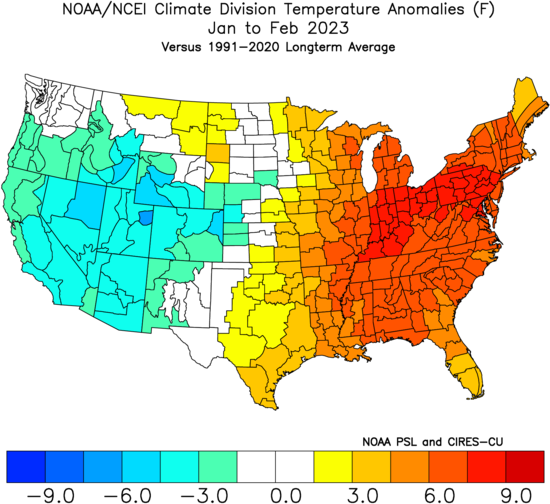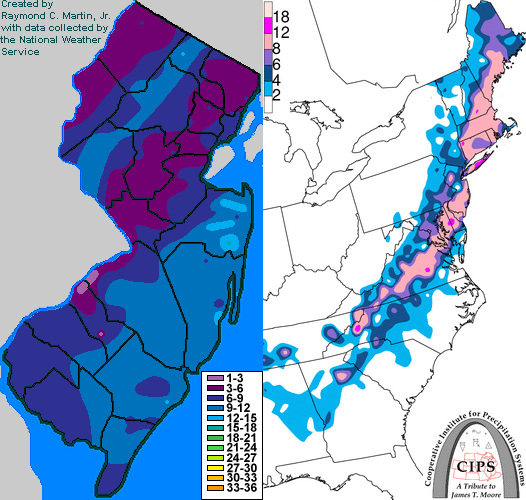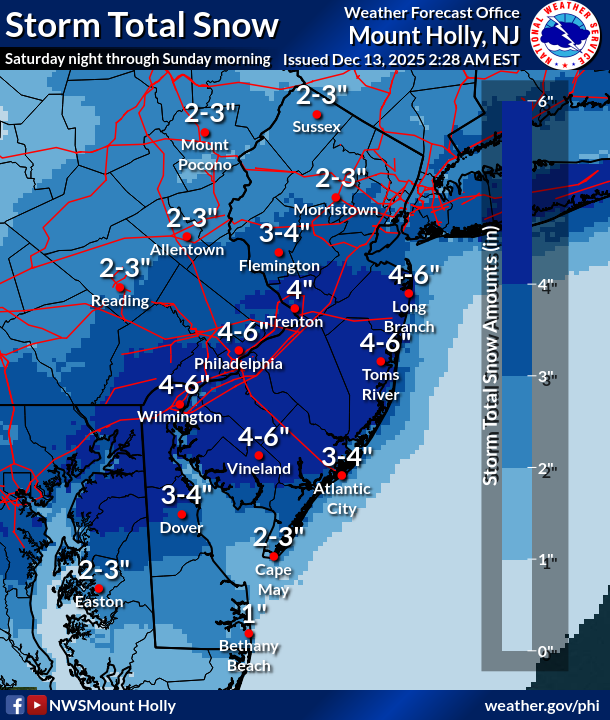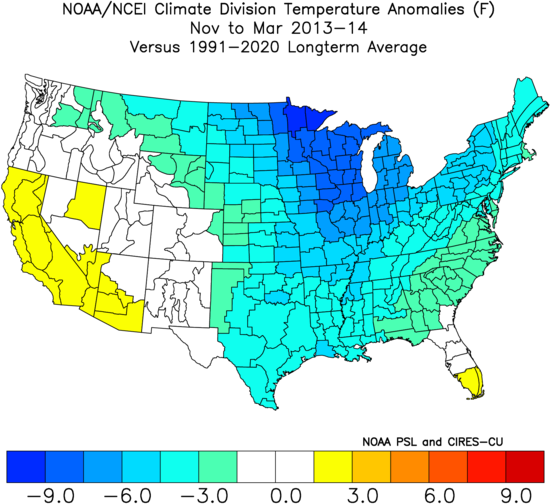
PhiEaglesfan712
Members-
Posts
1,331 -
Joined
-
Last visited
Content Type
Profiles
Blogs
Forums
American Weather
Media Demo
Store
Gallery
Everything posted by PhiEaglesfan712
-
I was too young (about a year and a half), but the weather records show that the January 1990 average temperature was 15 degrees warmer than the December 1989 average temperature. That type of temperature jump is something you see from March -> April or April -> May. You don't see that in the dead of winter. It's like spring began in January that season.
-
2025-2026 ENSO
PhiEaglesfan712 replied to 40/70 Benchmark's topic in Weather Forecasting and Discussion
The most obvious ones are the most recent: 2016-17 and 2022-23. In case you forgot, here's what happened the last time a dissipating la nina led into an el nino: -
2025-2026 ENSO
PhiEaglesfan712 replied to 40/70 Benchmark's topic in Weather Forecasting and Discussion
Previous years with similar ENSO/IOD/PDO patterns. They tend to have cool Decembers, but torch in January and February. -
2025-2026 ENSO
PhiEaglesfan712 replied to 40/70 Benchmark's topic in Weather Forecasting and Discussion
January and February are going to torch. 16-17 is probably the best analog. This could be a great snow season if you live in Syracuse. Not so much if you live in Atlantic City. -
2025-2026 ENSO
PhiEaglesfan712 replied to 40/70 Benchmark's topic in Weather Forecasting and Discussion
16-17 was generally a torch in January and February in the Eastern US. It just had a very odd distribution of snow. It was the snowiest season ever in Syracuse (almost 160 inches). But places like Baltimore and DC only got ~3 inches of snow. Talk about a very sharp cutoff. 08-09 is another weird one. Despite how cold October-January was, it would have went below average on snow without the KU on March 1-2. -
2025-2026 ENSO
PhiEaglesfan712 replied to 40/70 Benchmark's topic in Weather Forecasting and Discussion
Looks like it's completely in the center. That's a bullseye if we're playing darts. -
2025-2026 ENSO
PhiEaglesfan712 replied to 40/70 Benchmark's topic in Weather Forecasting and Discussion
World News Tonight got the year of the last December snowstorm wrong. It was in 2020, not 2018: https://x.com/ABCWorldNews/status/2000383451434774960 You would think this would be fact-checked before a major news organization like ABC airs it. -
E PA/NJ/DE Winter 2025-26 Obs/Discussion
PhiEaglesfan712 replied to LVblizzard's topic in Philadelphia Region
1995-1996 -> That one was a wall-to-wall great winter. 2000-2001 -> Okay winter overall, but left a very sour taste with the huge snow bust in March. 2005-2006 -> Very mild January, but a return to winter in February, highlighted by the snowstorm on the 11th-12th. March is mild. 2010-2011 -> Very cold and snowy January, turns milder in February, although a moderate snowfall happens around President's Day. No more snow after that, but we do get one last hurrah of well below average temperatures in late March. 2020-2021 -> January has no snow and above average temperatures until the last day of the month. February is cold and snowy. March is mild. -
E PA/NJ/DE Winter 2025-26 Obs/Discussion
PhiEaglesfan712 replied to LVblizzard's topic in Philadelphia Region
It seems like all the la nina/-ENSO years that end in 5 or 0 are cold in December. See 1995, 2000, 2005, and 2010. The only one one that wasn't cold was 2020, and we got a snowstorm mid-month. -
Saturday night/Sunday 12/13-12/14 Jawn
PhiEaglesfan712 replied to Ralph Wiggum's topic in Philadelphia Region
Heck, even Atlantic City is getting snow. That's been hard to come to by the last 7-10 years. -
Take it down a little south: This is really the first time since the January 28-29, 2022 snowstorm that we got this type of storm track, where there is more snow towards the coastal areas.
-
2025-2026 ENSO
PhiEaglesfan712 replied to 40/70 Benchmark's topic in Weather Forecasting and Discussion
Sorry guys, but the MJO isn't going back to phase 8. Get ready to learn phase 5. -
If I remember correctly, the eastern end of the storm produced heavy snow, and caused the Metrodome roof collapse. The Vikings game got pushed back, but it wasn't enough to save the Brett Favre streak.
-
Yeah, we can't leave December without at least an inch or two of snow. Cold and snowless Decembers are the absolute worst. 2022-23 is a very good example. I can't remember a time when a cold and low snow December produced a great rest of the winter season.
-
2025-2026 ENSO
PhiEaglesfan712 replied to 40/70 Benchmark's topic in Weather Forecasting and Discussion
88-89 was the strong la nina. 89-90 was a dissipating weaker la nina/cold neutral, and was firmly ENSO neutral by the time the winter was over. The IOD was still at -1.4 on November 24, pretty much comparable to 2016 and 2022, both of which were low snow winters at PHL, and torched in January and February. The mid-March snowstorm in 2017 kept that year from being another below 10 inch snowfall season at PHL, and we all know the disaster that 2022-23 was. Cold and low snow Decembers are the worst combination. They almost always produce torch Januarys and Februarys. Come to think of it, I can't remember a time when a cold and low snow December produced a great rest of the winter. -
The yards being muddy is a good sign. That usually means the drought is coming to an end soon.
-
2025-2026 ENSO
PhiEaglesfan712 replied to 40/70 Benchmark's topic in Weather Forecasting and Discussion
This only works if December torches, like in 2015, 2021, or 2023. A cold December, like this one, makes it more likely, based on the law of averages, a torch will happen in January. The period of winter might already be happening. -
2025-2026 ENSO
PhiEaglesfan712 replied to 40/70 Benchmark's topic in Weather Forecasting and Discussion
The MEI finally updated. Here are the values for the past several months: MJ 2025: -1.2 JJ 2025: -1.2 JA 2025: -0.9 AS 2025: -1.1 SO 2025: -1.2 ON 2025: -1.1 -
2025-2026 ENSO
PhiEaglesfan712 replied to 40/70 Benchmark's topic in Weather Forecasting and Discussion
Alabama only got into the playoff because of their name. Take away their name, and their resume is no better than teams like Illinois or UConn. Actually, those teams beat the ACC Champion. Alabama lost to the 13th place ACC team. If Alabama is the playoff, then let Illinois and UConn be in at as well. -
2025-2026 ENSO
PhiEaglesfan712 replied to 40/70 Benchmark's topic in Weather Forecasting and Discussion
Pretty much all the metrics are screaming at me "warm January and February". I mean, we got a deep -IOD. The last 2 times we had that, January and February literally torched. 89-90 is once in a lifetime, though. We had the coldest December, than turned into spring in January, and winter never really returned. PHL temperatures (Dec 1989-Mar 1990): Dec 89: 25.5 Jan 90: 40.3 Feb 90: 41.2 Mar 90: 46.1 A 15-degree increase in between December and January is absurd. That's something you see in between spring months (and sometimes, you don't even get a monthly swing that big). The Decembers in 95, 00, 05, and 10 all ended up in the 31-34.5 range (and this December may end up not even being that cold), so the turnaround won't be as dramatic. -
E PA/NJ/DE Winter 2025-26 Obs/Discussion
PhiEaglesfan712 replied to LVblizzard's topic in Philadelphia Region
Why not just run the ball there? We were already in field goal range. The only thing you can't do there is throw an interception. This is eerily similar to the 2023 collapse. That was the 3rd straight loss, also on a Monday night (in 2023, it was against the Seahawks, which also ended in Hurts throwing an interception). -
2025-2026 ENSO
PhiEaglesfan712 replied to 40/70 Benchmark's topic in Weather Forecasting and Discussion
Now that you put it this way, 2013-14 qualifies as a textbook wall-to-wall cold winter in the Eastern US. Pretty much 5 months straight of cold. Plus, it was a season that showed early cold, with a colder than average August and September. -
2025-2026 ENSO
PhiEaglesfan712 replied to 40/70 Benchmark's topic in Weather Forecasting and Discussion
13-14 and 14-15 are probably the closest we're going to get to a wall-to-wall cold winter in this climate. Both years had 4 out of 5 months well below average (November and January-March). -
2025-2026 ENSO
PhiEaglesfan712 replied to 40/70 Benchmark's topic in Weather Forecasting and Discussion
My gut tells me that December will come in cold, but not historic cold like 1989. It will end up in the -4 to -6 range, like 1995, 2000, 2005, and 2010. January and February will probably torch, though. -
2025-2026 ENSO
PhiEaglesfan712 replied to 40/70 Benchmark's topic in Weather Forecasting and Discussion
The big difference between the 1989 and 2005 analogs is that we got the flip back colder in February 2006. We even got a snowstorm on the 11th-12th. I can see this one happening again (you could even argue that we already did in 20-21). With 1989, there was no going back to winter once the calendar flipped to 1990. Spring pretty much began in January that year. 89-90 is a once-in-a-lifetime analog that will never happen again. It should be retired.











